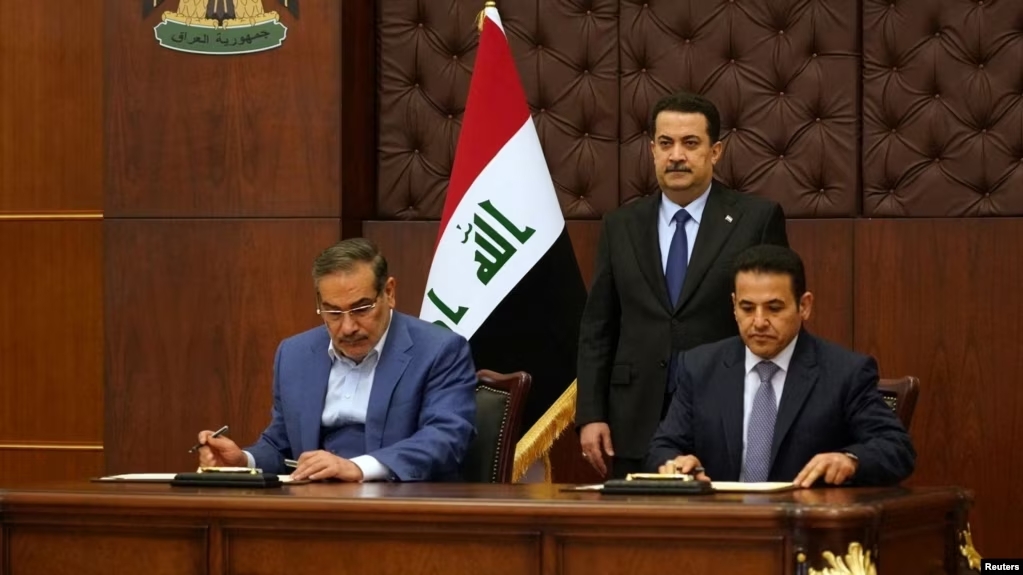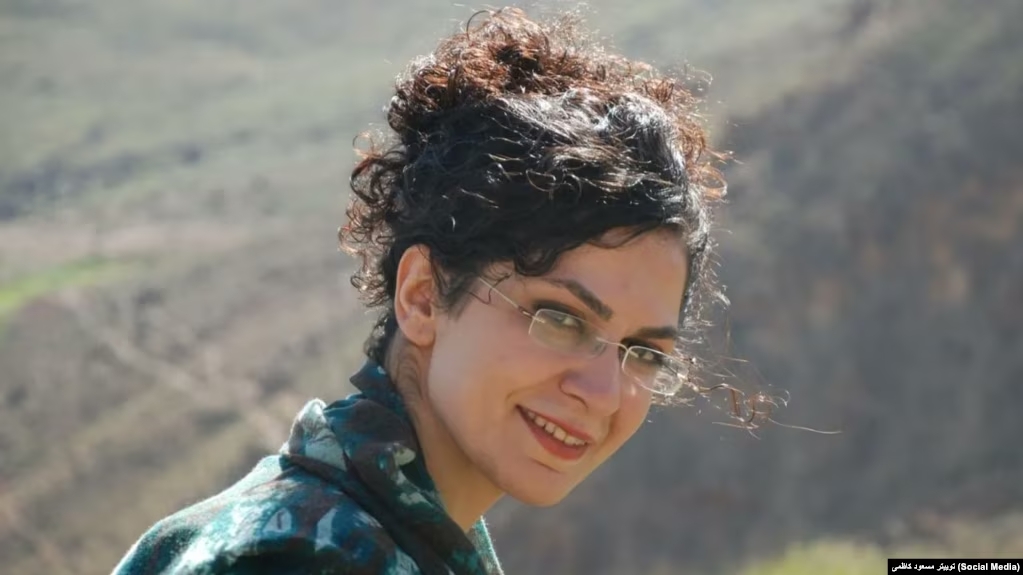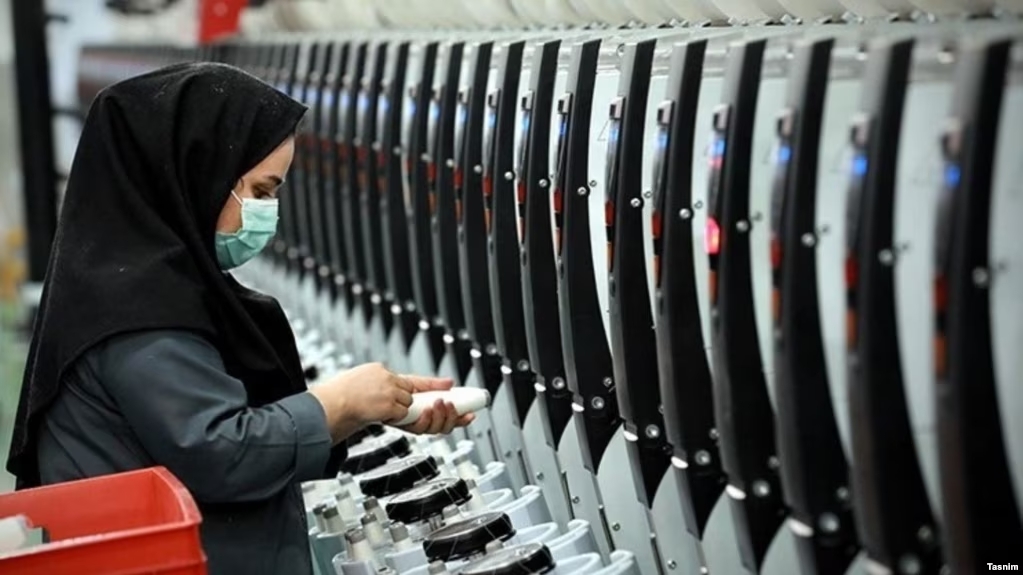
Changing Direction: From Confrontation to Interaction With the World
The editorial of Jahan Sanat cites recent developments in Iran’s foreign policy, emphasizing that only through engagement with the world will it be possible to achieve development and economic prosperity.
The new Iranian year started on Monday. In recent weeks leading to the new year, there were many breakthroughs in Iran’s foreign policy, the results of which might be seen in coming months. Even though Ebrahim Raisi’s record regarding the economy is not acceptable and all the economic decisions taken by his government have failed, the news of Iran and Saudi Arabia resuming relations had positive impacts on Iran’s economy, proving that an interactive foreign policy can be the solution to Iran’s deteriorating economy.
For more than a decade, Iran’s economy has suffered from tough sanctions. The sanctions started under Mahmoud Ahmadinejad’s government when it adopted a confrontational approach against the world. Hassan Rouhani’s government tried to take the path of engagement and peace with the world after signing the nuclear deal. But he failed, and when the deal was suspended, the sanctions were reinstated.
As a result of the sanctions, there was a significant drop in investment, an increase in capital flight, skyrocketing inflation, and a shrinkage of people’s tables. Moreover, we could witness a surge in brain drain and a drop in public trust – an issue that can be seen in its worst possible way these days.
In recent days, there have been big developments in foreign policy. The visit of Iran’s Supreme National Security Council Secretary Ali Shamkhani to China and the agreement with Saudi Arabia and then his trip to the UAE all indicate diplomatic activities of a security entity. It seems that Shamkhani, as Iran’s representative, will undertake other international visits and his meetings will be of great significance for Iran’s diplomacy.
If so, does this mean there is a change in Iran’s strategy from confrontation to engagement with the world? Or is this engagement just for the short run to decrease the current pressures on Iran’s economy?
There is no doubt that now that Iran has limited options under the pressure of the sanctions, this engagement with the world can be promising. But there are many ambiguities in this regard: does this mean a change in the Iranian government’s strategy? And will Ebrahim Raisi’s government go along with these changes?
Shamkhani’s mission reveals the fact that any country’s development and welfare depend on its engagement with the world. No country, as a matter of fact, has ever achieved development in isolation!
Spread of Poverty and Class Disparity
The editorial of Eghtesad Saramad insists that the Iranian government should take measures to stop the widening class disparity, underscoring that if no steps are taken in this regard, it will have irreparable consequences.
It is every citizen’s natural right to enjoy social privileges, services and welfare with no worries at all. This is because expansion of social services and welfare will not only satisfy citizens, but also create justice for individuals and social cohesion at different levels of society, enhancing unity between people, the government and the state.
Advancing justice and increasing the level of services will result in a balance which will elevate the level of accountability, commitment and ethical conduct among senior managers and officials. It also strengthens national solidarity among people. If, for some reason (be it political, economic, social, cultural, religious, etc.), the social balance is disrupted, the balance in society will be unsettled which will in turn result in irreparable losses.
The current social and economic conditions in Iran reveal that with widespread poverty and the widening class disparity, the lack of social balance is turning into an increasingly corrosive problem which will lead to many challenges if it is not resolved swiftly. These challenges will gradually become numerous crises.
One of the factors in increasing social disparity and disrupting the social balance is the monopoly of a certain group over social privileges through rent-seeking, systematic corruption, bribery, factionalism, etc.
When a small group allocates a lot of privileges to themselves, their children and relatives, then it is the rest of society that has to pay for it. In all societies, poverty manifests in two forms: relative and absolute. Under these circumstances, society will divide into two groups: a small group which is happy with the status quo and a large group that, lacking the social privileges, is unhappy with the ongoing circumstances.
So the Iranian government must opt for scientific, logical and structural changes to stop the spread of the economic crisis and the widening of the class disparity. It must take real objective measures to stop the destruction of the middle class.
Balance in Foreign Policy
The editorial of Arman Melli argues that the Iranian government must seek to achieve a balance in its foreign policy and pursuing the country’s economic interests.
From the beginning, Ebrahim Raisi’s government asserted that its regional policy aims to build friendly relations with neighboring countries, intending to create balanced relations with these countries. The government also vowed to opt for the policy known as “Look to the East” which has been fulfilled as Iran’s membership in the Shanghai Cooperation Organization and resuming relations with Saudi Arabia demonstrate.
What must be noted here is that the Iranian republic has followed the so-called policy of “No East, No West” in its agenda from the beginning. That is why the government should not lean too much toward the East and forget the abovementioned slogan in its foreign policy. A balance should exist in engagement with the world.
Looking toward the East means that the Eastern bloc can help Iran to stand up against the West’s hegemony. But if the East’s hegemony is going to replace the West’s, then it is going to backfire, which is why the foreign policy apparatus must act carefully.
Iran must have relations with both the East and the West to boost its domestic development. If the government is only intent on having nominal diplomatic relations with other countries, such a foreign policy cannot have any effect on the country’s economic situation.
Such a diplomatic approach adopted by Iran might be more to the advantage of other countries. For instance, Iraq is taking advantage of Iran’s economic situation, while Tehran is benefitting much less from the Iraqi market.
Raisi’s government has taken positive steps in establishing relations with other countries and becoming a member of the Shanghai Cooperation Organization and participating in different economic forums, but these steps must earn economic profits for Iran as well.
Creating Jobs With the Participation of the Private Sector
The editorial of Kasb-o-kar emphasizes the fact that the government must pave the way for the private sector to play a substantial role in creating jobs.
Creating millions of jobs requires surmounting the existing obstacles. Currently, many big obstacles must be removed from the path of creating jobs, while some of these obstacles are structural and cannot be removed in the short run. So, some fundamental steps must be taken for overcoming these obstacles.
Furthermore, businesses have been seriously damaged by the sanctions. At first, the government must provide technical assistance to entrepreneurs and businesses.
In recent years, no plan has been fully implemented. But before implementing any large-scale plan, the government must include the necessary mechanisms in its agenda. To do so, there is no option but to pave the way for the private sector to play an extensive role.
One of the most important features in this field is giving the priority to production. It is wrong if the government thinks that it can create jobs without the cooperation of the private sector. To decrease unemployment and enhance long-term job creation, it is essential to enable people to participate in the economic field.
Creating stability in the labor market through long-term employment opportunities requires an increase in production and knowledge-based businesses. If Iran wants to create a real private sector, then entrepreneurs must play a role in the market.

Iran and Iraq Sign Security Agreement

Iran’s Supreme National Security Council Secretary Ali Shamkhani, during his trip to Baghdad, signed a security agreement with his Iraqi counterpart to end the activities of the opposition forces to the Iranian regime in Iraq’s Kurdish region.
The deal was signed with Iraq’s National Security Advisor Qasim al-Araji in the presence of Iraqi Prime Minister Mohammad Shia al-Sudani.
Iran’s Supreme National Security Council reported that the deal between the two countries has been underway for several months and will have a decisive impact on managing security challenges between Iran and Iraq.
The Iraqi prime minister’s office issued a statement in this regard, and without mentioning the details, announced that a security agreement has been reached which includes coordination in protecting the joint border between the two countries and boosting cooperation in several security fields.
According to Shamkhani, who represents Iranian Supreme Leader Ali Khamenei in Iran’s Supreme National Security Council, this deal, if implemented, will guarantee security and stability along the two countries’ shared border.
Earlier, Noor News, a media outlet close to Iran’s Supreme National Security Council, had reported that the activities of anti-Iranian regime groups in Iraq’s Kurdish region were the main issue in this security deal.
In recent years, the IRGC has repeatedly attacked with missiles and drones the positions of Kurdish groups in Iraqi Kurdistan.
These attacks escalated along with nationwide protests in Iran, particularly because the protests were more extensive in Iran’s Kurdish region. To suppress the protests in its Kurdish region, Iran deployed its military forces and heavy and semi-heavy weapons. According to Kurdish Human Rights Watch, more than 100 protesters were killed in these attacks.
During his meeting with his Iraqi counterpart, Shamkhani once again spoke against the United States, alleging that the US presence in the region is “disrupting the security and stability.”
The Iranian regime has repeated called for the withdrawal of US forces from Iraq but the US Minister of Defense during his recent trip to Iraq underlined Washington’s commitment to maintain its forces in this country.
Political Prisoner From Evin: Survival of the Iranian Republic Is Against the Survival of Iran

Bahareh Hedayat, a political prisoner, has issued a message from Evin Prison on the eve of the new Iranian year (which started on Monday). Honoring those who were killed in the recent protests, she urged the overthrow of the Iranian regime saying, “If we want freedom, whichever way we go, it will end in ending the clerical regime and removing political Islam from governance.”
Pointing to the names of those killed and executed during the recent nationwide protests, Hedayat writes, “This is the eighth new year’s eve that I have spent in the prison of the Islamic Republic, but my faith in victory is now more than ever.”
Stating that the Iranian regime has transformed into the most unethical aspect of Iranian people’s lives, Hedayat emphasizes that its survival is in contradiction with the survival of Iran and the Iranian people.
This former student activist underscored that “I hold my head high and am proud of my compatriots,” adding that in her eighth year of imprisonment, she wishes that what remains of her life can be used to heal the wounds of the people and save the nation of Iran ultimately. She goes on to say that “If my life is my share in this world, I am ready to give it all, without any complaints, for realizing the Iranian people’s will.”
This is not the first time that Hedayat has written from the prison to stress the necessity of overthrowing the Iranian regime. In a previous letter from Evin Prison, she considered the recent protests as different from the “reformist” movement in Iran, urging that the “revolution” would be victorious and the Iranian regime “must go.”
Khamenei’s Representative Wages War Against Women Who Do Not Wear Hijab

Six months after Iran’s protest movement of “Woman, Life, Freedom,” the authorities are still under the impression that they can stamp it out by re-escalating restrictions on women.
In the latest case, the editor of Kayhan daily and representative of Supreme Leader Ali Khamenei has issued threats against women who remove their veils in public.
Addressing the authorities, Hossein Shariatmadari wrote that if they do not confront women’s unveiling, “people” would “enter the battlefield” to take the matter into their own hands.
Not clarifying who exactly he means by the word “people,” Shariatmadari noted, “People might think that officials are not capable of confronting some of the women who unveil themselves or, God forbid, not doing their duties thoroughly.” He continued, “so they themselves might confront such deviations which threaten religious beliefs, chastity and morality in society.”
Khamenei’s representative added that the “consequences of such measures would be detrimental.”
These threats came after the bloody crackdown of peaceful protests following the killing in custody of 22-year-old Mahsa Amini.
Meanwhile, Ahmad Reza Radan, Iran’s police chief, stated that “numerous” meetings on hijab were recently held in the Interior Ministry, adding that “people” would not “tolerate” the opposition to obligatory hijab.
In addition to those statements, the closure of 17 tourism centers as well as “issuing warnings” against 258 centers for “not observing the rules of Islamic hijab” was reported by the deputy to the Ministry of Cultural Heritage and Tourism Ali Asghar Shalbafian.
Yet, the most brazen and insulting proposition in this regard came from Hamshahri daily which said police forces should ask the women who believe in hijab to confront them with “the naked and lecherous” women in order to “put them right.” The Iranian authorities often consider women who take off their veils as “naked.”
In an establishment whose supreme leader recurrently encouraged his supporters to “fire at will” when the government “cannot act properly,” such blatant invitations to violence are no surprise.
Only 27 Percent Raise in Workers’ Wages With Inflation Rate at 53 Percent

While Iran’s Statistical Center has announced that point-by-point inflation for last month was more than 53 percent, workers’ wages in Iran have only increased 27 percent, reaching 5,308,000 tomans per month for the new Iranian year (which started on Monday).
Earlier, there were reports of strong differences among the members of the Supreme Labor Council in this regard, which consists of representatives of the government, employers and workers.
After the recent agreement, one of the workers’ representatives Ali Khodaie asserted that giving in to this rate of increase in wages does not mean the workers’ representatives are satisfied with it at all.
According to Iranian media outlets, currently the poverty line in Iran is at least 18 million tomans per month and official statistics reveal that at least 14.5 million workers are subject to labor laws.
In the meantime, the Ministry of Cooperatives, Labor and Social Welfare in its annual report called “Monitoring Poverty” announced that there was a 71 percent growth in poverty risk in the first half of the last Iranian year. It also stated that in the past decade, the number of poor has doubled with more than 30 percent of the population below the poverty line.
The worker’s livelihood basket last month reached 17,843,000 tomans, which has almost doubled compared to the same month last year.
Principle 41 of Iran’s labor law stipulates that an increase in workers’ wages must be compatible with the inflation rate and livelihood basket.
In recent years, Iranian workers have increasingly held gatherings in protest over their living conditions.
Earlier, the workers of Haft Tappeh Sugarcane Company, in their protests, had called the performance of Ebrahim Raisi’s government “anti-people and anti-workers.”
Workers’ protests have continued along with the nationwide protests of “Woman, Life, Freedom.”
